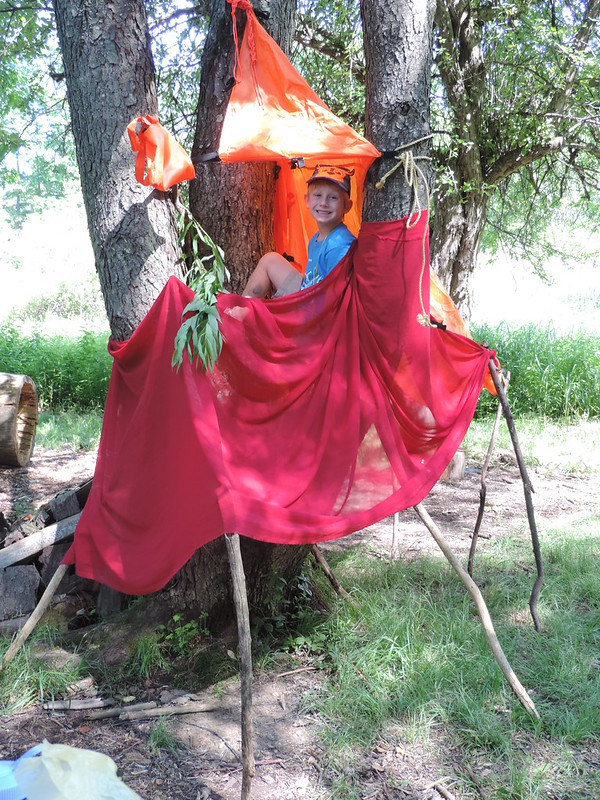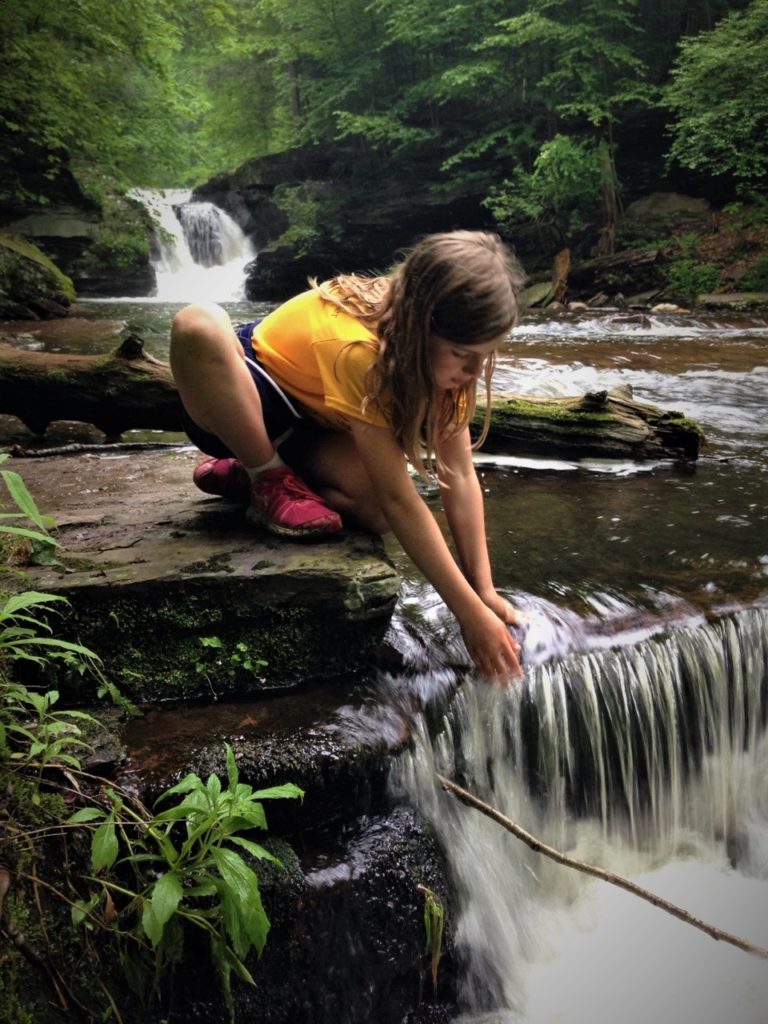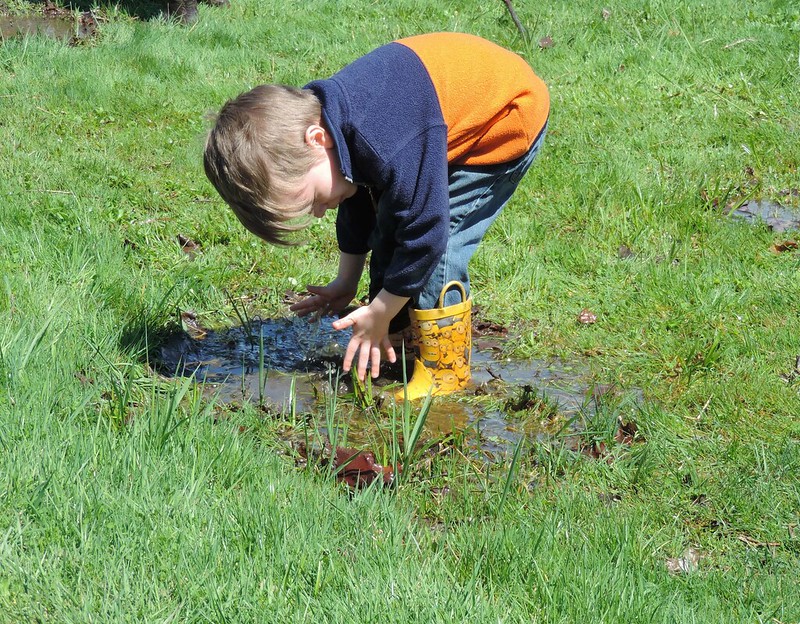This article is a reprint from June 2018. Amid the COVID-19 virus, we all need something to lighten our hearts. Nothing does that better than play. It is also important to note children learn and practice social, emotion, cognitive, and physical skills through play. So when creating their at-home school schedule during this time, don’t forget to include plenty of play time.
I visited my parent’s house this past weekend. I navigated the “S” turn driveway leading up to the house and yard. This space was carved out of the woods, first by farmers, who knows how many years ago. Perhaps the towering White Pines would know. This pocket of human settlement among so much green still feels like home. It is an oasis in a busy world. It is an escape, full of memories — many of them outside. These are the woods in which I rambled, the yard in which I played and the house in which I grew up.
The stars aligned and my two sisters and their young children were also able to visit that weekend. In the sunnier weather, we hiked, played, walked the gardens and talked about yard and house projects. In the rainy weather, we continued the much-needed purging to move the house from “what was” to “what is”. We went through the remaining clothes, books, and toys of our youth to make room for the next generation to join in the visits to grandma’s and grandpa’s house.

In the rearranging of what used to be my room, I took down a framed print of Winnie the Pooh and Christopher Robin standing on a bridge. The inscription on the back read “To Katie — In life take time to stop and play. It refreshes the spirit. From Mom and Dad with love.”
I think we all agree that play is good for children. It teaches them myriad physical, social, emotional, and cognitive skills such as balance, sharing, appropriate risk taking, and conflict resolution. Play is what prepares children for life.
So a picture of Winnie the Pooh with a note about the importance of play is a lovely present for a child. However, this present from my parents was given to me when I was young but not so young. I was 17 — an age when, amidst the work of becoming an adult, I needed to be reminded to play.
Can play survive growing up? Play seems like it is a simple, childish thing, limited only to the young. There are many different forms of play. Play has no material gain. It is the activity itself and not the outcome that is important. And most of all, play is pleasurable.

The “play” written on the brown paper backing of this print was not about playing a sport, playing the market, or playing slot machines. This “play” was the play of my childhood. The playing in creeks and ponds, exploring new places, not being afraid to get dirty. It is mystery, magic and imagination. It was a reminder to not take adult life so seriously. And that perhaps being like a child through play was really the more mature thing to do.
So yes, play can survive growing up. There are some things that should be taken seriously in life. But play happens outside of ordinary life. In a time and sometimes a place set aside for such things.
For inspiration, what if you….
- Splash in puddles during or after a rain.
- Play Pooh sticks. (See A.A. Milne’s The House at Pooh Corner for directions.)
- Skip stones.
- Have a watermelon-seed-spitting contest.
- Make mud food. (Why limit it to just pies?)
- Walk on a log, curb, or wall.
- Play catch.
- Build a fort.
- Build things (towers, people, fairy houses) along the trail for someone else to find.
- Walk across a fallen log.
- Find a big tree and see how many people it takes to make a circle around it.
- Swing.
- Get your hands in the dirt.
- Climb rocks.
- Make funny shadows in the sunshine.
- Make up songs.
- Lay down outside, look up and find pictures in the clouds or the stars.
Even with these guidelines, I have trouble deciding what counts as play. It seems to be more about the attitude in which you bring to an activity rather than the activity itself. Many activities can be done with a playful attitude. Being open to the joy in the unexpected. Wondering at what is around you. Being curious. Being child-like.
Perhaps this is just the ramblings of an imaginative mind at the end of a lovely weekend. A mind still drifting in the nostalgia of childhood. But a childhood firmly rooted in play, particularly outside play, provides a solid foundation for an adulthood with play. I think it was a moment of seriousness when Willy Wonka said, “A little nonsense, now and then, is relished by the wisest men.” Doesn’t everyone need a lift to his or her spirits? Couldn’t we all free ourselves from earthly burdens, challenges and struggles for a time through play?
If you have done these things, or many other playful things, keep doing them and add to the list. If you haven’t, have you considered it? And if you have considered it and are unsure, partner up with a child. They can show you the way.
Katie Finch is a nature educator at Audubon.
Audubon Community Nature Center builds and nurtures connections between people and nature. ACNC is located just east of Route 62 between Warren and Jamestown. The trails are still open from dawn to dusk as is Liberty, the Bald Eagle. Though the Nature Center is currently closed due to COVID-19 restrictions, drive-thru sales are available from the Blue Heron Gift Shop. More information can be found online at auduboncnc.org or by calling (716) 569-2345.


Recent Comments